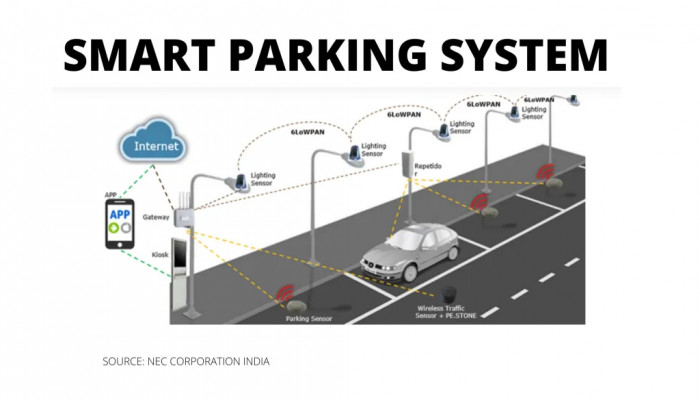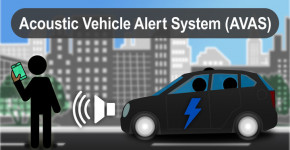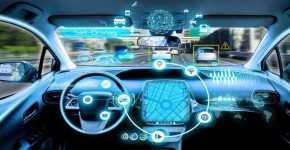 Launch apps instantly. Claim $200 credits on DigitalOcean
Launch apps instantly. Claim $200 credits on DigitalOcean
The difference between a conventional and smart parking system
Written by Manat » Updated on: March 20th, 2024

A smart parking system uses parking and bay sensors to guide vehicles to a parking slot. Because of this, there is no need for manual operation.
Most parking systems are conventional because they need round-the-clock staff. However, the smart parking system developed by NEC India can be managed remotely. It uses parking sensors and bay sensors to guide the vehicle owners to the available parking slot.
The entry of the vehicle is facilitated by RFID technology. An RFID tag and reader can easily authenticate and usher in a registered vehicle.
There are other technologies available for seamless entry of a vehicle without the need for any manual effort. License plate recognition and Bluetooth low energy are the other technologies that can be used to give access to registered vehicles.
Apart from access technologies, numerous applications are available in smart parking systems. Parking reservation applications, parking guidance systems, and mobile payment applications are some important applications available for users.
The parking guidance system uses parking and bay sensors to guide the vehicle to a vacant slot. The parking reservation application helps users pre-book a parking slot.
The application dashboard of the parking system serves as a centralized hub to monitor the performance and status of various applications. It provides a comprehensive overview of the parking system, allowing the parking operator to assess status quickly at any moment.
All information required by a parking operator is available on the cloud. These data can be accessed at any time from anywhere, making remote management a real proposition. The operator also learns about any violations in real-time, allowing them to take the appropriate action.
Any new parking tariff rates can be implemented quickly as the smart parking system helps the operator use a tariff engine. The overall performance of the parking lot, be it on-street or off-street, can be assessed with the help of analytics.
Source referred: https://in.nec.com/en_IN/solutions_services/intelligent_transport_solutions/smart_parking.html
The Benefits of Smart Parking Systems
1. Convenience and Time-Saving - With a smart parking system, drivers no longer need to spend precious time circling around lots in search of an available space. The use of parking and bay sensors streamlines the process, guiding vehicles directly to an open slot. This convenience not only saves time but also reduces frustration for drivers.
2. Remote Management - Traditional parking systems often require on-site staff to manage operations. However, smart parking systems, like the one developed by NEC India, can be remotely monitored and managed. This feature eliminates the need for round-the-clock staffing, leading to cost savings for parking operators.
3. Seamless Entry - Smart parking systems utilize advanced technologies such as RFID, license plate recognition, and Bluetooth low energy for seamless entry of vehicles. With RFID technology, registered vehicles are authenticated effortlessly, ensuring smooth entry and exit from the parking facility without the need for manual intervention.
4. Enhanced User Experience - Applications such as parking reservation systems and mobile payment apps enhance the overall user experience. These applications allow drivers to reserve parking slots in advance and make payments conveniently through their smartphones. Additionally, parking guidance systems assist drivers in finding available spaces quickly, further improving user satisfaction.
5. Centralized Monitoring- The application dashboard of a smart parking system serves as a centralized hub for monitoring and managing various aspects of the parking facility. Operators can easily access real-time data on occupancy rates, revenue, and violations, enabling them to make informed decisions and take timely actions when necessary.
Frequently Asked Questions (FAQs) About Smart Parking Systems
1. How does a smart parking system work?
Smart parking systems use parking and bay sensors to detect available spaces and guide vehicles to them. Advanced technologies such as RFID, license plate recognition, and Bluetooth low energy facilitate seamless entry and exit of vehicles.
2. What are the benefits of using a smart parking system?
Some benefits include convenience and time-saving for drivers, remote management capabilities for operators, seamless entry for registered vehicles, enhanced user experience through applications, and centralized monitoring of parking operations.
3. Can smart parking systems be managed remotely?
Yes, smart parking systems can be remotely monitored and managed, eliminating the need for on-site staff and reducing operational costs for parking operators.
4. Are smart parking systems user-friendly?
Yes, smart parking systems are designed to be user-friendly, with intuitive interfaces for applications such as parking reservation and mobile payment. These systems aim to enhance the overall experience for drivers.
5. How do smart parking systems contribute to efficiency?
By utilizing technologies like parking sensors and RFID, smart parking systems optimize space utilization, reduce search time for drivers, and enable operators to monitor and manage parking facilities more effectively, ultimately leading to greater efficiency.
6. Can I pre-book a parking slot with a smart parking system?
Yes, many smart parking systems offer parking reservation applications that allow users to pre-book parking slots, providing added convenience and peace of mind for drivers.
7. Are smart parking systems cost-effective for operators?
Yes, smart parking systems can lead to cost savings for operators by reducing the need for manual labor, optimizing space utilization, and enabling efficient management of parking facilities.
8. What types of technologies are used in smart parking systems?
Smart parking systems employ a range of technologies, including parking and bay sensors, RFID, license plate recognition, and Bluetooth low energy, to facilitate seamless entry and exit of vehicles and enhance overall operational efficiency.
9. How secure are smart parking systems?
Smart parking systems prioritize security and employ robust authentication mechanisms such as RFID tags and license plate recognition to ensure the safety and integrity of the parking facility.
10. Can smart parking systems accommodate different types of vehicles?
Yes, smart parking systems are designed to accommodate various types of vehicles, from compact cars to larger SUVs and trucks, providing flexibility for drivers and optimizing space utilization within the parking facility.
11. How does the application dashboard of a smart parking system benefit operators?
The application dashboard provides operators with real-time data on parking occupancy, revenue, and violations, allowing them to make informed decisions, optimize operations, and address issues promptly to enhance overall efficiency and profitability.
12. Are smart parking systems environmentally friendly?
Yes, smart parking systems contribute to environmental sustainability by reducing traffic congestion, fuel consumption, and emissions associated with searching for parking spaces, thereby promoting cleaner and greener urban environments.
13. Can smart parking systems adapt to changing parking tariff rates?
Yes, smart parking systems feature tariff engines that enable operators to implement new parking tariff rates quickly and efficiently, ensuring flexibility and responsiveness to changing market conditions.
14. How do smart parking systems contribute to urban mobility?
By optimizing space utilization, reducing search time for drivers, and promoting efficient use of parking facilities, smart parking systems play a vital role in enhancing urban mobility and addressing the challenges of congestion and limited parking availability in urban areas.
15. What are the long-term benefits of investing in a smart parking system?
Investing in a smart parking system offers long-term benefits such as increased operational efficiency, cost savings, enhanced user experience, improved traffic flow, and reduced environmental impact, making it a valuable asset for parking operators and urban planners alike.
Conclusion
Smart parking systems represent a significant advancement in parking technology, offering a wide range of benefits for both drivers and operators. By leveraging advanced sensors, RFID technology, and mobile applications, these systems optimize space utilization, streamline parking operations, and enhance the overall user experience. With features such as remote management capabilities and centralized monitoring, smart parking systems are poised to revolutionize the way we park and manage vehicles in urban environments, ultimately leading to more efficient, sustainable, and user-friendly parking solutions.
Copyright © 2024 IndiBlogHub.com Hosted on Digital Ocean









Post a Comment
To leave a comment, please Login or Register